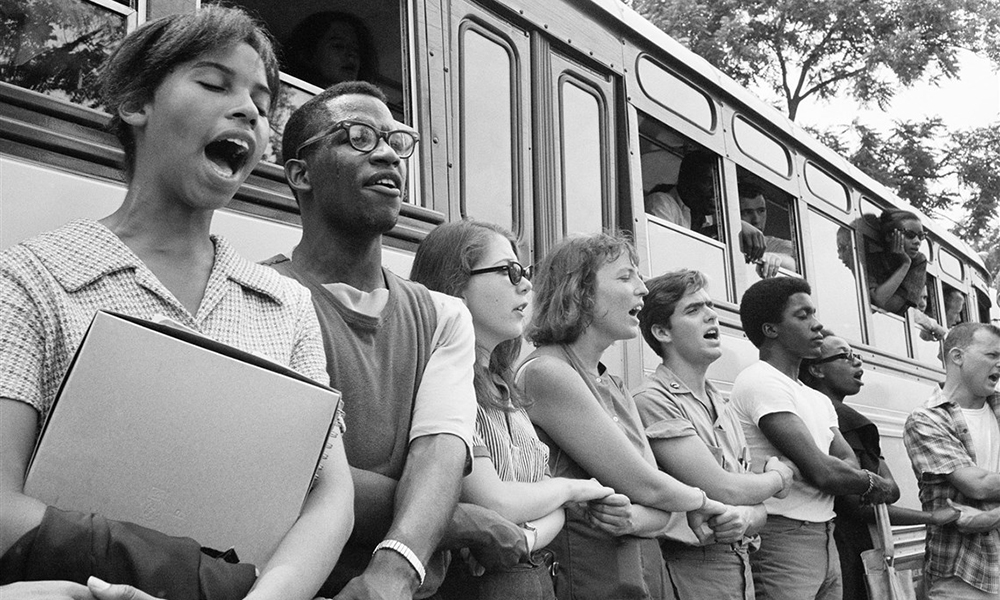
Ted Polumbaum
Freedom Riders in 1964 Mississippi.
Each generation possesses a somewhat egotistic belief that they are wiser and more competent than the generation before. We are no exception. We often boast that in our heyday, we valued life more, worked harder, maintained stronger relationships, embraced family values and we definitely were not glued to our smartphones, computers and tablet devices. In our minds, today’s youth can take some lessons from the generations that preceded them, particularly our own. Because we know what life is really like. We know the real world, and we know what it takes to change it.

Pamela Larde
Or do we?
Just recently, we witnessed millions of young people around the world lead a movement near and dear to their hearts — a movement that they vow will result in safer schools via stricter gun laws and initiatives designed to reduce the chances of mass shootings unfolding in their educational environments.
One has to ask: Why weren’t the parents motivated to organize this movement? What is it about the young spirit, generation after generation, that has the power to ignite worldwide attention over tragic incidents like those that occurred in Parkland, Florida?
In the 1960s, it was the Freedom Riders. In the 1970s it was the peace movement. In the 1990s, it was California’s Proposition 209. At the forefront at each of these movements were teens and young adults, bold enough to take a stand, hopeful enough that their voices could actually make a difference.
Dissecting Self-Determination
There is a theory that might explain the spirit and motivation of young people that we continue to see over time, and that is self-determination theory. According to this theory, there are three puzzle pieces that make up our capacity for motivation. This is what two psychologists from the University of Rochester, Dr. Richard Ryan and Dr. Edward Deci refer to as our three psychological needs: autonomy, competence and relatedness. We have the motivation to push forward when these three needs are fulfilled.
As humans, we are born with these needs fulfilled at full capacity, and thus, motivated from the moment of birth. As babies, we scream when we feel pangs of hunger. As toddlers, we try relentlessly to walk until we take that first victorious step. As kindergartners, we feed our curiosity by climbing, throwing and even tasting unfamiliar objects until we understand what they are there for. We come hand-crafted with motivation, as we operate with our own sense of autonomy, competence and relatedness from the moment of birth.
But what happens to motivation between our early years and the teenage years? It all depends on the environment and the extent to which our sense of autonomy, competence and relatedness are nurtured or suppressed.
The Power of Environment
For the Florida students who are at the forefront of this latest social movement, the three psychological needs seem to be embedded right into their communities and into the heart of this movement.
Autonomy: Their teachers and parents are encouraging the freedom to publicly use their voices and to express themselves in the way they choose to. This encouragement results in a sense of autonomy that allows the students to craft and implement their own plan of action without resistance.
Competence: Even in the face of criticism, they are receiving international praise for their ability to rally millions around the world to join their cause. This praise reinforces the belief in themselves that they can make a difference.
Relatedness: They are experiencing the love and support of family, friends and other members of the local community as they mourn the loss of their friends and as they process the impact of this traumatic experience. This emotional support offers a sense of human connectedness needed to continue forward when the will feels weak.
While individually all three psychological needs may be fulfilled on a regular basis in the private households of all students, it is telling to see how powerfully motivating it can be when a community comes together to create an environment that nurtures these three psychological needs. Even those of us who fall through the cracks can be uplifted.
The Waning of Self-Determination
In the face of vile and insulting criticism from adults who believe that teens should not be involved in politics, these young activists are demonstrating to the world what an entire two generations of adults have only been bickering about for decades. Perhaps the very thing that we tout as our badge of honor for being so experienced in life — living in the real world — is the very thing that stifles our motivation as adults.
In the real world, we lose much of our autonomy, as our decisions and lives are largely framed around the level of freedom our financial situations grant us. Our competence is challenged by politics and oppression in the workplace and in our communities that reward us for staying in our lanes and punish us for wanting to be heard. And our capacity for relatedness is often tainted by broken relationships resulting in divorce, betrayal and family feuds — experiences that make us fearful to trust the way we used to in our younger years.
Throughout the course of history, we have seen the passion and motivation of our youngest generations through social movements, technological advances, and literary masterpieces. In every era, we underestimate the power of our youth. They are so intensely motivated because they are the ones in our society who are closest to being naturally motivated, as we once were at birth.
The lesson here? Keep nurturing the young people in our lives before they hit our real world. As parents, educators, mentors, coaches and mental health professionals, it is our duty to be intentional about the doses of competence, autonomy and relatedness we instill in them. Let’s develop and implement strategies that keep that spark of motivation alive. Some ideas include expressing love, encouraging creativity, praising their talents, engaging them in dialogue about change, listening to them and validating their concerns.
We could take a lesson from these young activists. If, as a cohort of Gen Xers and baby boomers, we can embrace a greater sense of competence, autonomy and relatedness, perhaps we could experience our own spark of much-needed renewed motivation.
Pamela Larde, Ph.D., is an associate professor of research at Mercer University and a certified life coach. Her research focuses on interpersonal relationships, self-motivation, life purpose and post-traumatic growth. She has written four books and contributed chapters to various academic texts.






























